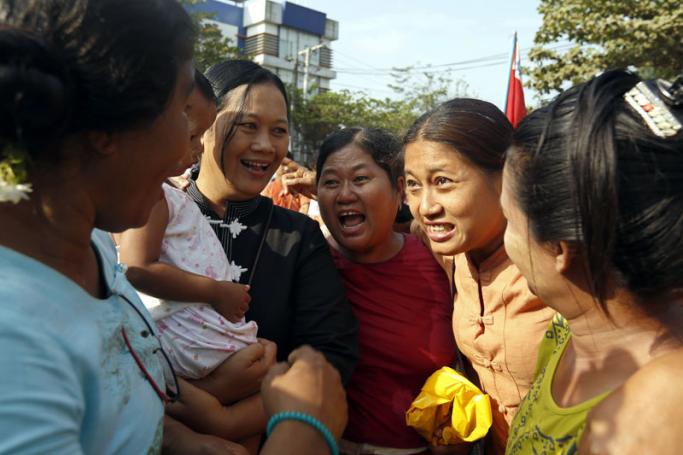The UN High Commissioner for Human Rights warmly welcomed the release Sunday of a second wave of 83 prisoners on Myanmar's New Year, by Presidential amnesty, according to a press briefing on 19 April.
Released prisoners include land rights activist Naw Ohn Hla who had been jailed six times for various peaceful protests; human rights defender Nay Myo Zin; community campaigner Htin Kyaw; five journalists from the Unity newspaper who were sentenced to seven years in prison in 2014 after the publication of an article; four labour activists convicted for supporting garment workers on strike; and Htin Lin Oo, sentenced in 2015 to two years in prison with hard labour for "insulting religion" after he delivered a speech criticising the misuse of religion to incite religious hatred.
The Government announced that these releases were part of its commitment to promote national reconciliation. President U Htin Kyaw also stated in his New Year address that sustained effort would be made in the future to prevent "those who act legally for political causes or for their own conscience from being imprisoned".
According to the statement, “The continued release of political prisoners and the commitment to take preventive measures are important steps in the right direction. We encourage the Government to build upon such human rights gains to ensure that all the people of Myanmar enjoy their fundamental freedoms. In doing so, we encourage the Government to ensure that all those who have been arbitrarily detained, including in remote areas, are also promptly released.”
Among those who remain behind bars are interfaith activists, Pwint Phyu Latt and Zaw Zaw Latt, who were sentenced in February 2016 to two years' imprisonment with hard labour under the Immigration (Emergency Provisions) Act 1947, and U Gambira, also known as Nyi Nyi Lwin, a prominent figure in the 2007 Saffron Revolution, who is currently on trial in Mandalay under the same legislation.
“Our office stands ready to provide its expertise in support of efforts by the Government and Parliament to reform remaining laws that do not conform with international standards and have been used in the past to jail peaceful critics, and to take further strides in promoting and protecting human rights in Myanmar.” Ravina Shamdasani, the Spokesperson for the UN High Commissioner for Human Rights, was quoted as saying.
You are viewing the old site.
Please update your bookmark to https://eng.mizzima.com.
Mizzima Weekly Magazine Issue...
14 December 2023
Spring Revolution Daily News f...
13 December 2023
New UK Burma sanctions welcome...
13 December 2023
Spring Revolution Daily News f...
12 December 2023
Spring Revolution Daily News f...
11 December 2023
Spring Revolution Daily News f...
08 December 2023
Spring Revolution Daily News f...
07 December 2023
Diaspora journalists increasin...
07 December 2023
PPP candidate interested in extracting resources from mountains east of Pyinmana












